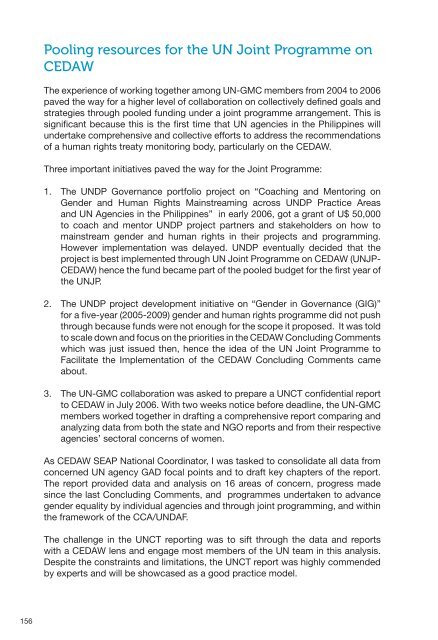Section 3 - Educating and Partnering for CEDAW
Section 3 - Educating and Partnering for CEDAW
Section 3 - Educating and Partnering for CEDAW
Create successful ePaper yourself
Turn your PDF publications into a flip-book with our unique Google optimized e-Paper software.
Pooling resources <strong>for</strong> the UN Joint Programme on<br />
<strong>CEDAW</strong><br />
The experience of working together among UN-GMC members from 2004 to 2006<br />
paved the way <strong>for</strong> a higher level of collaboration on collectively defined goals <strong>and</strong><br />
strategies through pooled funding under a joint programme arrangement. This is<br />
significant because this is the first time that UN agencies in the Philippines will<br />
undertake comprehensive <strong>and</strong> collective ef<strong>for</strong>ts to address the recommendations<br />
of a human rights treaty monitoring body, particularly on the <strong>CEDAW</strong>.<br />
Three important initiatives paved the way <strong>for</strong> the Joint Programme:<br />
1. The UNDP Governance portfolio project on “Coaching <strong>and</strong> Mentoring on<br />
Gender <strong>and</strong> Human Rights Mainstreaming across UNDP Practice Areas<br />
<strong>and</strong> UN Agencies in the Philippines” in early 2006, got a grant of U$ 50,000<br />
to coach <strong>and</strong> mentor UNDP project partners <strong>and</strong> stakeholders on how to<br />
mainstream gender <strong>and</strong> human rights in their projects <strong>and</strong> programming.<br />
However implementation was delayed. UNDP eventually decided that the<br />
project is best implemented through UN Joint Programme on <strong>CEDAW</strong> (UNJP-<br />
<strong>CEDAW</strong>) hence the fund became part of the pooled budget <strong>for</strong> the first year of<br />
the UNJP.<br />
2. The UNDP project development initiative on “Gender in Governance (GIG)”<br />
<strong>for</strong> a five-year (2005-2009) gender <strong>and</strong> human rights programme did not push<br />
through because funds were not enough <strong>for</strong> the scope it proposed. It was told<br />
to scale down <strong>and</strong> focus on the priorities in the <strong>CEDAW</strong> Concluding Comments<br />
which was just issued then, hence the idea of the UN Joint Programme to<br />
Facilitate the Implementation of the <strong>CEDAW</strong> Concluding Comments came<br />
about.<br />
3. The UN-GMC collaboration was asked to prepare a UNCT confidential report<br />
to <strong>CEDAW</strong> in July 2006. With two weeks notice be<strong>for</strong>e deadline, the UN-GMC<br />
members worked together in drafting a comprehensive report comparing <strong>and</strong><br />
analyzing data from both the state <strong>and</strong> NGO reports <strong>and</strong> from their respective<br />
agencies’ sectoral concerns of women.<br />
As <strong>CEDAW</strong> SEAP National Coordinator, I was tasked to consolidate all data from<br />
concerned UN agency GAD focal points <strong>and</strong> to draft key chapters of the report.<br />
The report provided data <strong>and</strong> analysis on 16 areas of concern, progress made<br />
since the last Concluding Comments, <strong>and</strong> programmes undertaken to advance<br />
gender equality by individual agencies <strong>and</strong> through joint programming, <strong>and</strong> within<br />
the framework of the CCA/UNDAF.<br />
The challenge in the UNCT reporting was to sift through the data <strong>and</strong> reports<br />
with a <strong>CEDAW</strong> lens <strong>and</strong> engage most members of the UN team in this analysis.<br />
Despite the constraints <strong>and</strong> limitations, the UNCT report was highly commended<br />
by experts <strong>and</strong> will be showcased as a good practice model.<br />
156

















